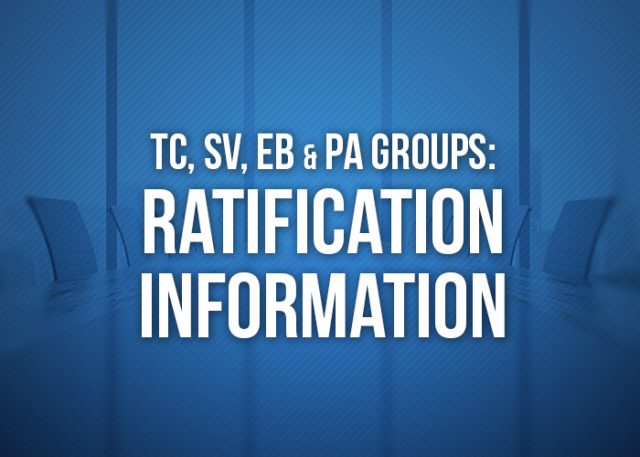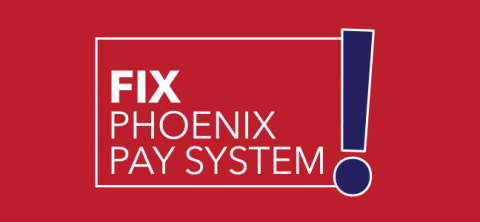(Article updated Jan. 26)
PSAC and Treasury Board have reached a tentative agreement for the Technical Services (TC) Group, which covers more than 11,000 federal public service workers. The deal includes significant breakthroughs on “common issues,” such as sick leave and workforce adjustment, the details of which were hammered out by the common issues committee last December. The TC bargaining team was also able to make meaningful improvements to monetary compensation, enhancing existing allowances and creating new allowances for specific groups of members.
“I thank the bargaining team for all their hard work and dedication to the members of the TC group. It has been a long two years. They resisted concessions, and in the end, they were able to achieve something for everyone,” said PSAC National President Robyn Benson.
Common issues need to be implemented at all tables
The issues agreed to in December between the employer and the common issues committee, composed of members from all five Treasury Board tables, need to be accepted by each specific table. The TC bargaining team has formally accepted the work of the common issues committee, which covers sick leave and the workforce adjustment appendix.
Sick leave
- The sick leave articles of our collective agreements will remain unchanged.
- The parties have negotiated a Memorandum of Agreement to establish a Task Force to develop recommendations on measures to improve employee wellness and reintegration of employees.
- Any future enhancements to the regime would need to be negotiated and agreed to by both parties.
- PSAC’s four principles are included in the MOA: sick leave provisions will be contained in the collective agreement, provide for wage replacement, protect and grandfather sick leave banks, and will not be administered by a third-party provider. Any enhanced sick leave regime shall contain, at minimum, these four principles.
Workforce adjustment appendix
- What we achieved represents the most significant improvements in workforce adjustment since it was first signed as an appendix into PSAC collective agreements in 1998.
- Changes will reduce involuntary layoffs by allowing volunteers to come forward to leave the public service during times of workforce adjustment.
- Employees will now have up to fifteen months to find an alternation match.
- More union involvement, ensuring employees have the right to union representation during the process.
- Limits to contracting out.
- Improvements to the monetary provisions, including the education allowance and transition support measures.
Monetary gains
TC members will receive a 1.25 percent economic increase per year, over four years, as well as a 0.5 percent market adjustment in the third year. A signing bonus of $650 will be paid to those members who do not receive a group specific salary adjustment. Those group specific adjustments include:
- Roll-in the remaining value of the terminable allowance to Appendix A-1 and an additional increment of four percent to the maximum rates of pay at all levels for Marine, Rail and Air Technical Inspectors, effective June 22, 2016.
- Increases to the monies paid in Appendix W to EG and GT members working in shore-based positions at Canadian Coast Guard (CCG), effective June 22, 2016.
- New allowance of $3,000 per year for Fishery Officers (GT-02 to GT-05), effective June 22, 2016.
- New allowance of $3,000 per year for Enforcement and Wildlife Officers (GT-02 to GT-05) at ECCC, effective June 22, 2016.
- New allowance of $3,000 year for Technical Inspectors (TI-03 to TI-07) employed at Measurement Canada, effective June 22, 2016.
- New allowance of $3,000 for Labour Affairs Officers (LAO) at the TI-05 level, effective June 22, 2016.
- New allowance of four percent for Search and Rescue Coordinators (GT-05) working at the Joint Rescue Coordination Centre (JRCC).
- Additional increment of four percent to the maximum rate of pay of PI levels, effective June 22, 2016. Add the PI-CGC-07 rates of pay.
- New allowance of $2,500 for EG-06 at Fleet Maintenance Facilities (FMF).
Additionally, the EG allowance contained in Appendix V will be rolled into the base rate of pay, effective June 22, 2016 and delete Appendix V. However, EG members who receive this roll-in and no other special measures above will be eligible for the $650 signing bonus.
Helping workers meet family demands
A committee will be established to look at childcare needs. Better family leave, including provisions for extended family, have also been negotiated. Significantly, the definition of family has been improved to include more family members. This means members can utilize relevant provisions of the collective agreement for more members of their family.
Other notable gains
- New language has been included in the collective agreement to better protect members from being switched from day workers to shift workers, and vice-versa.
- Travelling Time: the cap for travel in 34.04 has been increased to 15 hours, from 12.
- The amounts paid under Appendix K for Diving Duty and Transfer at Sea have been improved.
- Volunteer Leave has been included into Personal Leave, increasing the amount of time to two days, which can be split into smaller periods for ease of use.
- The union and employer have signed a Memorandum of Understanding examining the comparability of EG work and compensation in the federal public service and the Canadian Food Inspection Agency.
- We have a commitment to undertake occupational group structure review for the TC group and have new job evaluation standards completed by 2019.
- Minor improvements to language on discipline and access to employee files.
The Memorandum of Understanding that established the Task Force on Mental Health in the workplace is also contained in this agreement. The mandate of the task force includes identifying ways to reduce and eliminate the stigma associated with mental health issues, improving communication on mental health challenges in the workplace, and implementing the National Standard of Canada for Psychological Health and Safety in the Workplace. The parties came to an agreement on the MOU earlier in the bargaining process, in 2015, and the task force has been hard at work ever since.
The TC Bargaining Team is unanimously recommending acceptance of this agreement. Further information will be made available to TC members in the near future.
Download: Summary of Tentative Agreement reached for the TC Group on January 21, 2017 [Bilingual PDF]
A version of this article was originally published on the PSAC website.










